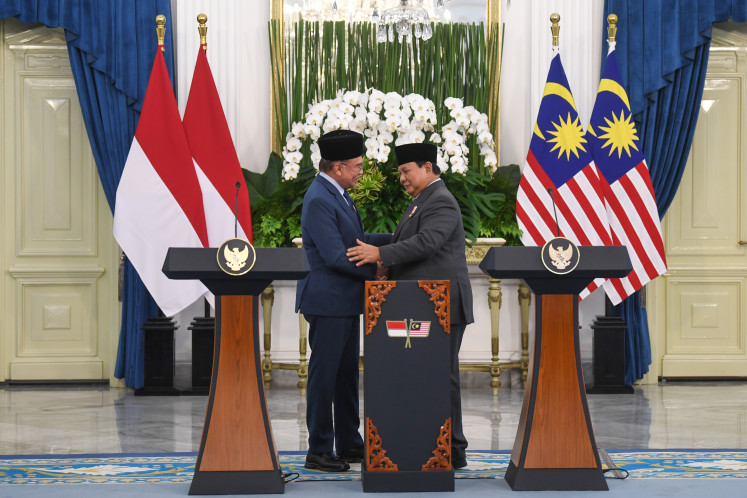Popular Reads
Top Results
Can't find what you're looking for?
View all search resultsPopular Reads
Top Results
Can't find what you're looking for?
View all search resultsWeekly 5: Success in the capital's slums
The residents of many slum areas in the city are taking forward positive programs to improve their livelihoods
Change text size
Gift Premium Articles
to Anyone

T
he residents of many slum areas in the city are taking forward positive programs to improve their livelihoods. Below are five success stories of residents' attempts to make their neighborhoods better.
Drug-free Warakas
Warakas, a slum area inhibited by laborers and street vendors at Tanjung Priok Port in North Jakarta, was notorious for its status as a drugs den back in the 1990s to early 2000s.
Residents said even police officers were afraid to enforce the law in the neighborhood, where the sale was drugs was common.
Nearly every week, several youngsters were nabbed for drug abuse. According to police data, around 80 drug-related deaths took place in the area from 2002 until 2007.
The residents then formed a task force comprising religious figures, officials, parents and youngsters, to intensively eradicate drug dealers from their neighborhood.
'We usually raided suspicious rented houses that were used by drug dealers for transactions,' said one of the pioneers of the task force, 66-year-old Tasimun Mudjiarto.
The efforts of the residents ' most of whom worked as laborers at the port ' paid off when Warakas was labeled a drug-free kampung by the National Narcotics Agency (BNN) last year.
Tambora's fire fighters
JP/DON
With a population of over 237,000, Tambora in West Jakarta is a densely-populated slum area, which is why fires frequently raze houses in the district. The Jakarta Fire Department recorded 42 fires there in 2013.
However, although the number of fires remains high, the number of casualties has sharply decreased mainly because residents have taken it upon themselves to learn how to deal with fires.
Jakarta Fire Department chief Subejo said 67 percent of fires in 2013 in Tambora had been handled by residents.
With financial assistance from a national company, the residents have also been trained to form designated fire squads that leap into action whenever fires emerge. As many as 1,650 fire task force members now live in 15 community units.
Productive youngsters in Johar Baru
Johar Baru subdistrict in Central Jakarta became infamous for its brawls and drug trafficking, but today it is a different place due to youngsters there turning away from the violence and drug culture and taking up the likes of designing, dancing, music and urban farming.
Facilitated by several University of Indonesia (UI) lecturers, the youngsters learnt new skills, sharpening their talents at Johar Baru community school. They recently showed off their skills at a cultural festival.
Ray Fahlevi Fajar, a 22-year-old participant, said he used to get involved in brawls and did not have steady job, but the school had given him the opportunity to learn new skills.
'I love painting and stencils. I hope I can make money from it,' he said.
Sociologist Paulus Wirutomo, who founded the school, said it took creativity and patience to solve urban issues, especially when it involved teenagers in places like Johar Baru.
'If we want to lead them away from their old lives, we needed to provide a clear solution. That's what we did,' he said.
Bukit Duri's environment-conscious squatters

Illegally residing on the banks of the Ciliwung River in Bukit Duri subdistrict, South Jakarta, squatters there constantly fear relocation at the hands of the city administration because of the latter's flood mitigation program.
But although they do not own the land, it does not mean they do not strive to better their environment.
Assisted by the Sanggar Ciliwung Merdeka organization, squatters in Bukit Duri have been trying to improve their neighborhood for many years with art performances, waste management and even new kampung designs.
Ciliwung Merdeka leader Sandyawan Sumardi said the city administration should appreciate the residents' initiative to become part of the solution and should involve them more in policies relating to their daily lives.
'The residents have potential and have willingly helped the administration. They also want to live in a better neighborhood. The problem is that the city rarely listens to them,' he said.
DIY waste management in Lenteng Agung
Garbage is a classic problem of neighborhoods living near riverbanks and Lenteng Agung subdistrict in South Jakarta, located near the Ciliwung River, is no exception.
As the Sanitation Agency has never handled the garbage issue in the neighborhood, residents have adopted as do it yourself (DIY) approach are managing their own waste.
They formed a garbage bank where they could deposit and sort their garbage. They even formed an urban farming group to use the compost they produced from organic waste. ' JP









